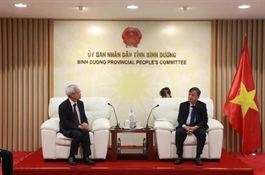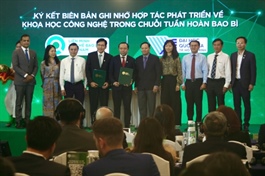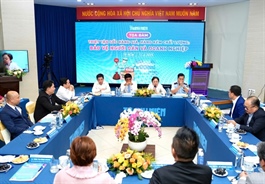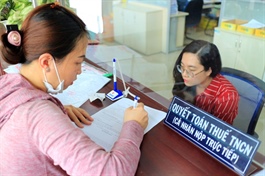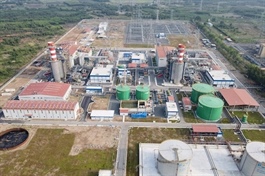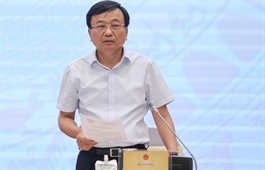Ho Chi Minh City enhances cooperation with Guangdong-Hong Kong-Macao Greater Bay Area
Ho Chi Minh City enhances cooperation with Guangdong-Hong Kong-Macao Greater Bay Area
More than 150 delegates from local governments, industry associations, and enterprises attended the Guangdong-Hong Kong-Macao Greater Bay Area (GBA Alliance) Investment and Trade Forum on June 12 in Ho Chi Minh City.

Domestics and international investors met at the event |
In his opening remarks, Nguyen Van Dung, vice chairman of the Ho Chi Minh City People’s Committee, emphasised that the event was part of efforts to realise the shared understanding reached by the top leaders of the Communist parties and states of Vietnam and the GBA Alliance.
Dung proposed several areas for cooperation between Ho Chi Minh City and the GBA, including a regional financial centre by learning from Hong Kong’s experience, promoting cooperation in renewable energy and green finance, enhancing investments in transportation infrastructure and smart urban development, advancing digital transformation, financial technology, and enhancing cross-border payment systems.
“Ho Chi Minh City is committed to improving the investment environment, enhancing trade promotion efficiency, and accompanying investors, including those from Guangdong, Hong Kong, and Macao, to make practical contributions to mutual development and elevate the cooperation between both sides,” said Dung.
Speaking at the forum, Jonathan Choi, chairman of the GBA Entrepreneurs Alliance, chairman of the Hong Kong-Vietnam Chamber of Commerce, chairman of the Hong Kong Chamber of Commerce in Qianhai (Shenzhen), and chairman of Sunwah Group, highlighted the advantages of the GBA.
“I believe the GBA will continue to serve as an effective bridge between China and Vietnam,” he said.
Representatives from the governments of Shenzhen, Qianhai, and various investment and trade promotion agencies from Hong Kong and Singapore all expressed their desire to strengthen ties with Ho Chi Minh City, especially as the city aspires to become a regional hub for finance and innovation within ASEAN.
Vietnam remains China’s largest trading partner in ASEAN.
In terms of investment, during the first five months of 2025, China was the third-largest foreign investor in Vietnam, after Japan and South Korea, with total registered capital reaching $1.81 billion, accounting for 25.8 per cent of all newly registered FDI, according to the General Statistics Office.
Notably, Chinese investors are increasingly investing in the production of electronic components and auto parts, aiming to leverage Vietnam’s cost advantages and strategic location in the global supply chain.
Chinese investors continue to show strong interest in Ho Chi Minh City, particularly in the processing and manufacturing industries, electronic components, and green energy. This shift reflects a broader investment trend into high-tech industries aligned with the city’s sustainable development orientation.
Shenzhen stands out for its rapid tech innovation and hardware manufacturing capabilities, while Guangzhou leads in research, biotechnology, and smart transportation.
Jiang Likun, director of the Hong Kong and Macao affairs office of Shenzhen People’s Government, emphasised that Shenzhen plays a key role in the GBA and is a leading economic and technological hub in Asia.
With a GDP of more than $517 billion in 2024, Shenzhen excels in strategic sectors such as 5G, AI, and new energy vehicles. “Shenzhen welcomes Vietnamese businesses and partners to explore cooperation opportunities, and is also ready to support Shenzhen-based enterprises in investing and starting businesses in Vietnam. We also encourage tourists from Shenzhen to visit Vietnam’s scenic spots to foster mutual understanding and deepen the friendship between the peoples of our two countries,” Likun said.
Meanwhile, Zhang Chun, head of business development and professional services at the Qianhai Authority, highlighted Qianhai’s position as a “special zone within a special zone” and a key gateway for Vietnam-GBA collaboration.
“Strategically located within the Greater Bay Area, Qianhai offers rapid access to Hong Kong and Macao, strong transport infrastructure, and a well-developed ecosystem of 18 industrial clusters focused on modern services, cross-border e-commerce, and technology,” said Chun.
She emphasised Qianhai’s legal and tax incentives, including China’s first regional investor protection law and mechanisms allowing international law in dispute resolution. With comprehensive support platforms like the Qianhai International Business e-Station and close cooperation with Hong Kong on IP protection, Qianhai is an ideal destination for Vietnamese enterprises seeking innovation, legal transparency, and market expansion.
As part of the forum, a cooperation agreement was signed between the Shenzhen International Business e-Station and the Vietnam Chapter of the GBA Entrepreneurs Alliance. This was alongside the launch of the Vietnam Centre of the Shenzhen (Qianhai) International Business e-Station, marking a major step in strengthening bilateral trade and investment ties. Additionally, several other cooperation agreements were signed between Chinese and Vietnamese enterprises, paving the way for practical collaboration in agriculture, trade, and manufacturing.

The Vietnam Centre of the Shenzhen (Qianhai) International Business e-Station was launched at the event |
- 11:41 13/06/2025







